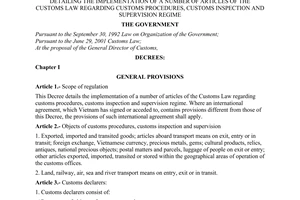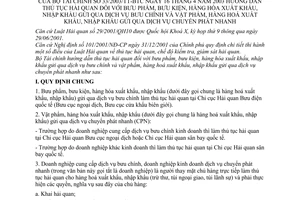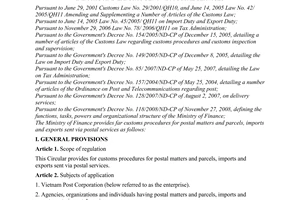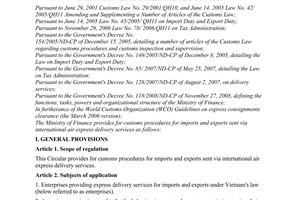Circular No. 33/2003/TT-BTC of April 16, 2003, guiding the customs procedures applicable to export and import postal items and parcels and goods sent via postal services as well as export and import articles and goods sent via express mail service đã được thay thế bởi Circular No. 99/2010/TT-BTC providing for customs procedures for postal matters và được áp dụng kể từ ngày 23/08/2010.
Nội dung toàn văn Circular No. 33/2003/TT-BTC of April 16, 2003, guiding the customs procedures applicable to export and import postal items and parcels and goods sent via postal services as well as export and import articles and goods sent via express mail service
|
THE MINISTRY OF FINANCE |
SOCIALIST REPUBLIC OF VIET NAM |
|
No: 33/2003/TT-BTC |
Hanoi, April 16, 2003 |
CIRCULAR
GUIDING THE CUSTOMS PROCEDURES APPLICABLE TO EXPORT AND IMPORT POSTAL ITEMS AND PARCELS AND GOODS SENT VIA POSTAL SERVICES AS WELL AS EXPORT AND IMPORT ARTICLES AND GOODS SENT VIA EXPRESS MAIL SERVICE
Pursuant to Customs Law No. 29/2001/QH10
passed on June 29, 2001 by the Xth National Assembly at its 9th session;
Pursuant to the Government's Decree
No. 101/2001/ND-CP of December 31, 2001 detailing the implementation of a
number of articles of the Customs Law on customs procedures as well as customs
inspection and supervision regime,
The Ministry of Finance hereby guides the customs procedures applicable to
export and import postal items and parcels and goods sent via postal services
as well as export and import articles and goods sent via express mail service,
as follows:
I. GENERAL PROVISIONS
1. Export and import postal items and parcels and goods (hereinafter referred collectively to as export and import goods) sent via postal services shall go through the customs procedures carried out at the international postal customs sub-departments (external service post offices and border-gate post offices).
2. For export and import articles and goods (hereinafter referred collectively to as export and import goods) sent via express mail service (EMS):
- In cases where the EMS is provided by the enterprises dealing in postal services, the customs procedures shall be carried out at the customs sub-departments of the external service post offices or the customs sub-departments of the international airports.
- In cases where the EMS is provided by other enterprises, the customs procedures shall be carried out at the customs sub-departments of the international airports.
3. Enterprises providing postal services, enterprises dealing in express mail service (hereinafter called enterprises for short) shall represent goods owners in directly carrying out the customs procedures for export and import goods (except for diplomatic and consular mails and bags) and have to exercise and perform the following rights and obligations of goods owners:
a/ To make customs declaration;
b/ To produce goods for customs inspection;
c/ To pay taxes, fees and other levies prescribed by law (if any);
d/ To receive export goods for exportation to foreign countries or import goods for delivery to goods owners;
e/ To notify the goods owners to directly contact the customs sub-departments of the external service post offices or the customs sub-departments of the international airports for handling cases where goods are not permitted to be exported or imported, or goods must be handled according to the provisions of law.
4. Regarding the reception of export goods and delivery of import goods: Enterprises shall organize by themselves the reception of export goods from goods owners or the delivery of import goods to goods owners and be responsible for managing such goods, provided that the places for carrying out the customs procedures for export or customs clearance of import goods are the customs sub-departments defined at Points 1 and 2 above.
5. Regarding the customs declaration:
a/ Enterprises are customs declarers. For new goods items, only goods owners are capable of making customs declaration. Where goods owners request to directly receive goods, they shall directly make customs declaration.
b/ The mode of making declarations upon flights, delivery shipments or work shifts (hereinafter referred collectively to as delivery shipments) shall be applied to tax-free goods, goods enjoying the tax rate of 0% and goods exempted from taxes. For each goods delivery shipment, enterprises shall register one written declaration of non-commercial export or import goods (according to the current regulations) for declaring export and/or import goods of many goods owners.
Vouchers to be enclosed with declarations: Detailed list of goods of each export or import lot (made according to the form HQ 01-BCCPN, not printed herein).
In cases where goods owners request separate declarations for their goods, customs declarers shall fill in separate declarations.
c/ For taxed goods, declarations shall be separately made in each declaration paper for each goods lot or goods package.
Tax collection receipts shall be made for each goods lot.
d/ In cases where import goods are of categories exempted from taxes (contractual processing, processing for export) but they have already been declared as taxable categories by enterprises upon carrying out the customs procedures, the goods owners shall bring such customs declarations for registration of wrong goods categories to the customs sub-departments of the export processing zones or the customs sub-departments managing contractually processed goods for re-filling in the declaration papers for right good categories. The export processing zones' customs offices or customs offices managing contractually processed goods shall advise the customs sub-departments of the concerned external service post offices or international airports to effect the reimbursement of tax amounts (if any) to the enterprises;
To avoid the above-said re-declaration, in cases where goods owners are informed that their goods have arrived in Vietnam, they shall go to the customs sub-departments managing processed goods and goods produced for export for registration of customs declarations for right goods categories, then forward dossiers to enterprises for continuing to carry out the customs procedures with customs sub-departments of the external service post offices or the customs sub-departments of the international airports.
e/ For export and import goods sent via the express mail service with the urgent time requirement (in service of production) or of small quantities, which are requested by their owners to be imported according to the non-commercial regime, the customs sub-departments of the external service post offices or the customs sub-departments of the international airports shall settle such goods owners' requests (by carrying out the procedures applicable to goods of the imported non-commercial category and fully collect taxes (if any) before the customs clearance, without tax reimbursement).
6. Enterprises which represent goods owners in carrying out the customs procedures shall be responsible for realizing the policies on export and import management and other tax, fee and charge policies.
II. SPECIFIC PROCEDURES
1. Export procedures:
a/ Responsibility of enterprises:
- To observe the provisions in Part I above.
b/ Responsibilities of customs offices:
- To carry out the customs procedures for export goods strictly according to regulations.
- In cases where goods are ineligible for export, the customs offices shall notify enterprises to carry out the procedures for returning them to their owners (except for goods items banned from export, which must be handled according to the provisions of law).
- To affix customs seals on special-use vehicles transporting export goods for which the customs procedures have been completed, for being brought to the export border-gates.
2. Import procedures:
a/ Responsibilities of enterprises:
- To observe the provisions in Part I above.
- Where goods cannot be returned to their owners, the enterprises shall, before sending them back to their countries of origin, have to produce such goods to the customs offices for re-checking.
- To manage goods and organize by themselves the return of goods to their owners after the customs offices issue customs clearance decisions.
b/ Responsibilities of customs offices:
- To carry out the customs procedures for import goods strictly according to regulations
- To carry out the procedures for reimbursing to enterprises the already collected tax amounts (if any) according to the Finance Ministry's regulations on tax reimbursement for cases where goods cannot be returned to their owners and must be sent back to their countries of origin as well as cases where enterprises make declaration of wrong goods categories (Point 5.d, Part I).
3. For diplomatic and consular bags:
Diplomatic and consular bags shall comply with Articles 61 and 62 of the Customs Law and the Ordinance on Privileges and Immunities for Vietnam-based diplomatic missions, consular offices and representative offices of international organizations.
4. Procedures for border-gate shifting:
a/ To promulgate together with this Circular the Slip for delivery of export and import postal items and parcels, articles and goods (form HQ 02-CCKBD, not printed herein).
This slip shall be used in cases where export goods are shifted from the customs sub-departments of the international post offices to the customs sub-departments of the export border-gates and where import goods are shifted from the customs sub-departments of the import border-gates to the customs sub-departments of the international post offices.
b/ Responsibilities of the slip-making customs sub-departments:
- To make two slips;
- To hand over these two slips together with goods to enterprises for forwarding to the receiving customs sub-departments.
c/ Responsibilities of the slip-receiving customs sub-departments:
- To receive two slips and goods;
- To make full certification as indicated in these two slips;
- To keep one slip and return the other slip to the slip-making customs sub-departments.
III. ORGANIZATION OF IMPLEMENTATION
This Circular takes effect 15 days after its publication in the Official Gazette and replaces the regulations in Decision No. 1550/2001/QD-TCHQ of December 26, 2001, Article 7 of Decision No. 19/2002/QD-TCHQ of January 10, 2002 of the General Director of Customs and other guiding documents contrary to the content of this Circular.
Any problems arising in the course of implementation should be promptly reported by the units and business establishments to the Finance Ministry for study and additional guidance.
|
FOR THE MINISTER OF FINANCE |




